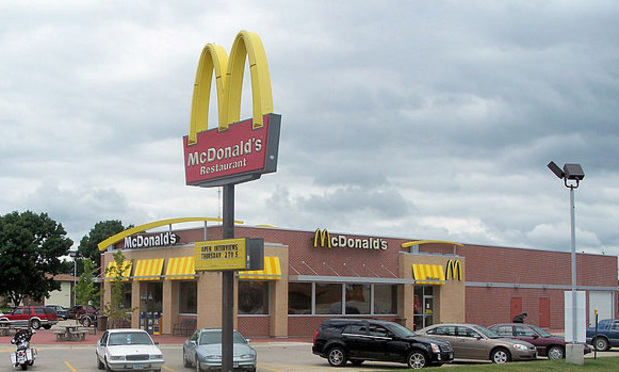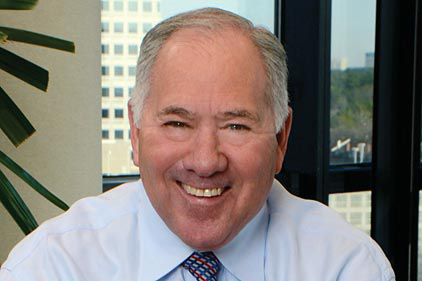With the recent decision that McDonald's and its franchisees could be joint employers, the National Labor Relations Board's general counsel has continued a series of far-reaching actions that could upend how many American companies conduct business, including recent decisions asserting jurisdiction over social media policies, confidentiality policies, other company policies of non-union workplaces, and even employee activity on Facebook.
The decision could also potentially allow unions greater access into industries than they currently have. On July 29, the National Labor Relations Board Office of the General Counsel announced that it had investigated 181 charges against McDonald's franchisees and the parent company McDonald's, USA, LLC about violations in the context of employee rights protests.
Although General Counsel Richard F. Griffin, Jr., found that 68 of the charges were meritless and 64 are still pending investigation, he found merit in 43 charges. Griffin took his decision one step further, finding both the franchisees and the franchisor could be potentially liable together. This determination could dramatically affect not just McDonald's, but any business that runs franchises by finding that both franchisor and franchisees share liability for employment decisions made at the franchisee level.
“The Office of the General Counsel has authorized complaints on alleged violations of the National Labor Relations Act. If the parties cannot reach settlement in these cases, complaints will issue and McDonald's, USA, LLC will be named as a joint employer respondent,” according to a statement by the NLRB. “In the 43 cases where complaint has been authorized, McDonald's franchisees and/or McDonald's, USA, LLC will be named as a respondent if parties are unable to reach settlement.”
McDonald's USA has vowed to fight the decision. “McDonald's serves its 3,000 independent franchisees' interests by protecting and promoting the McDonald's brand and by providing access to resources related to food quality, customer service and restaurant management, among other things, that help them run successful businesses,” said Heather Smedstad, Senior Vice President Human Resources, McDonald's USA, in a statement. “This relationship does not establish a joint employer relationship under the law. This decision to allow unfair labor practice complaints to allege that McDonald's is a joint employer with its franchisees is wrong. McDonald's will contest this allegation in the appropriate forum.
“McDonald's also believes that this decision changes the rules for thousands of small businesses, and goes against decades of established law regarding the franchise model in the United States,” she continued. “McDonald's, as well as every other company involved in franchising, relies on these existing rules to run successful businesses as part of a system that every day creates significant employment, entrepreneurial and economic opportunities across the country,” she said.
The National Restaurant Association is one of many groups to weigh in against the determination. “The ruling by the National Labor Relations Board's (NLRB) Division of Advice asserting that McDonald's Corporation is a 'joint employer' of its franchisees' employees overturns 30 years of established law regarding the franchise model in the United States, erodes the proven franchisor/franchisee relationship and jeopardizes the success of 90 percent of America's restaurants who are independent operators or franchisees,” said Angelo Amador, vice president labor and workforce policy, in a statement. “The long-established joint-employer standard has helped create millions of restaurant jobs through the franchisor/franchisee model. NLRB's attempts to overhaul the law will have dire consequences to franchisees, franchise employees, and the economy as a whole.”
While a final ruling on the case may be far off, companies should understand how the determination could impact them. Beyond the McDonald's case, they should prepare now for the NLRB to continue its recent expansion into non-union and non-traditional workspaces.
Union Activity Spurs Initial Complaints
According to media reports, the complaints filed against McDonald's started when fast-food employees waged a series of strikes in support of a $15 minimum wage. The strikes targeted McDonald's and other restaurants.
The strikes were reportedly organized by groups funded by unions. Efforts to increase wages are generally protected under the National Labor Relations Act (NLRA). After the strikes, workers filed complaints with the NLRB claiming they had been punished for their protests by having their hours cut or by being terminated, in violation of the NLRA.
While Griffin's determination is significant, it does not carry the weight of an NLRB ruling. If McDonald's doesn't agree to a settlement, the next step will be hearings before administrative law judges about the employees' claims in the various regional offices of the NLRB. If the administrative law judges find that unfair labor practices took place and that McDonald's is a joint employer, McDonald's can appeal. The appeal would take place before the NLRB. McDonald's could appeal any unfavorable rulings to the federal courts, and ultimately the U.S. Supreme Court.
Changes, Questions at the NLRB
The general counsel's determination comes at a time when the NLRB is being seen as becoming more pro-union, even as the U.S. Supreme Court has called many of its decisions into question.
The general counsel's latest actions against McDonald's are part of an ongoing attempt to broaden the definition of joint employer, and to increase the reach of the Board over non-union workplaces. The NLRB is also weighing a potentially far-reaching decision in Browning-Ferris Industries of California, Inc., et al. In a friend of the court brief filed in that case, Griffin called for a new, broader definition of the joint employer status. “The Board should abandon its existing joint-employer standard because it undermines the fundamental policy of the [National Labor Relations] Act to encourage stable and meaningful collective bargaining,” according to the brief.
McDonald's has rejected this new definition. “McDonald's does not direct or co-determine the hiring, termination, wages, hours or any other essential terms and conditions of employment of our franchisees' employees – which are the well-established criteria governing the definition of a 'joint employer',” said McDonald's Smedstad.
The determination also comes at a time when the validity of many of the NLRB's recent decisions has come under fire by the U.S. Supreme Court. In June, the nation's highest court issued a unanimous ruling in Noel Canning v. NLRB that found that the recess appointments of three of the five NLRB members, made in January 2012, were unconstitutional.
Griffin himself was one of the recess appointments that the Supreme Court ruled against. Before being sworn in as general counsel of the NLRB on Nov. 4, 2013, for a four-year term, he was an NLRB board member from January 2012 until soon after the Noel Canning decision, during the summer of 2013. Griffin has a long history with unions. Before joining the NLRB, he was general counsel for the International Union of Operating Engineers and also served on the board of directors for the AFL-CIO Lawyers Coordinating Committee.
Next Steps
If the NLRB ultimately upholds Griffin's determination, the effects could be far-ranging not just for those in the fast-food business, but for franchisors in other industries. Even companies that don't franchise need to be aware of the NLRB's changes in direction and increasing activity. A joint employer claim could be made regarding other workers that may be present in the workplace, such as contract or temporary employees. To prevent being blindsided by any new developments or decisions, companies should take several steps:
- Stay on top of new developments. While the McDonald's matter could drag on for years, companies that could be potentially affected need to monitor any new activity carefully. This will help be proactive in case adverse or dramatic rulings could impact long-standing standards and accepted ways of doing business.
- Involve HR and Legal. Any adverse rulings against McDonald's will cause ripple effects for hiring, staffing, liability and other areas. Companies should begin now to loop in different stakeholders, including the human resources and legal departments. This will help to ensure that everyone at the company is involved and educated, and that the company is speaking with one voice. Companies should also work with their outside counsel to understand all the legal ramifications and prepare a plan for moving forward, if necessary.
- Understand the politics. Many of the actions involved with recent NLRB activity revolve around unions trying to increase their numbers after years of declining membership. In many cases, unions are being met with sympathetic responses from elected officials and appointed boards. In order to ensure the best interests of organizations and their employees, companies need to be realistic about the political, legal and economic environment that is driving many NLRB rulings and decisions.
- Consider action through trade groups. As the unions understand, there is strength in numbers. Many trade groups, including the National Restaurant Association and the International Franchise Association, are working to educate those inside and outside their industries about the potential effects that broadening the definition of joint employer could have. Companies should consider working with relevant trade groups and others to make sure their voices are heard and their concerns are addressed before it is too late.
For companies that have struggled to stay afloat during recent economic and political events, the McDonald's case represents another challenge. By preparing now, companies can work to minimize any adverse impacts from the NLRB.
—————-
Richard D. Alaniz is senior partner at Alaniz Schraeder Linker Farris Mayes, L.L.P., a national labor and employment firm based in Houston. He has been at the forefront of labor and employment law for over thirty years, including stints with the U.S. Department of Labor and the National Labor Relations Board. Rick is a prolific writer on labor and employment law and conducts frequent seminars to client companies and trade associations across the country. Questions about this article, or requests to subscribe to receive Rick's monthly articles, can be addressed to Rick at (281) 833-2200 or ralaniz@alaniz-schraeder.com.
Thanks for reading CPA Practice Advisor!
Subscribe Already registered? Log In
Need more information? Read the FAQs
Tags: Accounting, Firm Management





